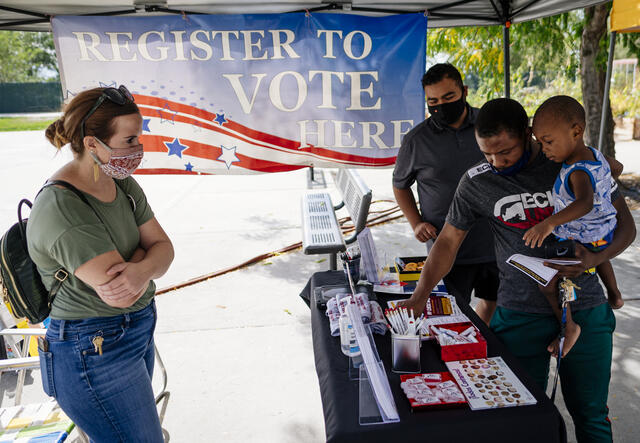Civic engagement and voter registration education is a strategic priority of the International Rescue Committee (IRC) in Salt Lake City. Helping refugees and new Americans to gain, maintain, and expand their voice within the community is central to the IRC’s global Strategy100. Through non-partisan educational efforts focused on voter registration and education, expanding understanding of civic engagement beyond only voting, and uplifting advocates from the communities we serve, the IRC in Salt Lake City is working to ensure that refugee and new American community voices are heard.
For those born in the U.S., the right to vote is inherent at the age of 18. Citizens exercise this right to shift seats of power, engage at every level of government from local to national elections, and more. However, refugees coming into the United States may work for years to become a naturalized U.S. citizen, finally giving them the ability to exercise the right to vote. No matter someone’s current citizenship status, there are a number of opportunities for individuals to become civically engaged, including providing testimony at legislative fora, signing petitions, writing petitions, attending meetings, and more!
Tatjana Andrews, community & civic engagement coordinator, and Annie Healion, Utah advocacy officer, recently discussed their perspectives on civic engagement and the importance of collaborative community advocacy.

What is civic engagement?
Civic engagement takes on many forms. At the IRC in Salt Lake City, focused efforts are made to increase access to non-partisan voter education, voter registration efforts, and providing information to refugee and new American communities about opportunities to be civically engaged outside of voting. This year, activities focused on identifying opportunities for those with legal permanent resident status, but not yet U.S. citizenship, to engage in their local communities and to complete voter education and registration activities at community events.
Why is it important to understand voting and civic engagement?
“I believe that when you become eligible, it is your right and responsibility to vote. Your voice is a powerful tool, it is important to educate representatives of the needs in your community. Voting is just one of the ways to do this,” said Tatjana.
The 2020 election calculated that 66.8% of citizens 18 years and older exercised their right to vote. Naturalized U.S. citizens make up 1 in 10 eligible voters. The IRC in Salt Lake City is committed to bringing educational opportunities around voting to communities served to increase understanding of the process, important deadlines, and how to gather information to make an informed vote. There are a lot of misconceptions about voter registration and rights. Tatjana’s work helps people understand that it is important to check your registration status, and know where to access information to inform every selection on a ballet. Find out more about voter education here »
How does the IRC approach advocacy efforts?
Informed by clients served and local offices, the IRC drives proactive legislation that is strategic, targeted, and will benefit the integration of newly arriving refugees and other immigrants across the U.S. The advocacy efforts made by the IRC in Salt Lake City and the broader organization reach all levels of elected offices and governments, from the local city halls to the chambers of Congress in Washington D.C. The IRC works to build or participate in collaborative partnerships that align with strategic priorities important to the communities served. Additionally, the IRC prioritizes opportunities to raise the voices of those with lived experiences including those currently receiving services, staff members, and other community members whose voice can affect policy changes.
How does advocacy work at the IRC?
This year, the IRC’s national advocacy team has been working to drive proactive legislation that is strategic, targeted, and will benefit the integration of refugee communities. At the local level, policy development and alignment is built through consultation with program staff and people served, assessing and identifying priority policy issues that directly affect refugees and other new Americans in our community. From there, Annie Healion, Utah advocacy officer, works to research current law and policy implementation to develop policy solutions. As potential solutions are identified, these ideas are shared with relevant stakeholders and decision-makers to build diverse coalitions of support, which are leveraged to promote the adoption of priority policy solutions.
“Our clients are central throughout this entire process - from engaging in policy development to supporting the adoption of policy solutions. Our clients are central to ensuring our advocacy is effective, proactive and representative,” said Annie Healion. The IRC’s advocacy team gathers testimony from local community members, identifies strategic media engagement, and other support systems to promote and gather bi-partisan support for legislative priorities. Focus areas continue to include language justice, increased resources for refugee resettlement programs, professional licensure and workforce development, universal representation and legal funding, and more.
Take a look at what our advocacy team accomplished in the last legislative session here »
How can Utahns take action?
In the next Utah legislative session, the IRC in Salt Lake City will be making efforts to advocate for in-state tuition access for refugees, asylees, parolees, and Special Immigrant Visa holders. The IRC continues to engage with educators to make sure that their new American students have access to the resources and support they need to excel.
You can stay involved and updated on these efforts by following the IRC in Salt Lake City on Facebook and Instagram. If you’d like to learn more or connect to support local advocacy initiatives, email us at SaltLakeCity@Rescue.org. You can also stay up to date on the IRC’s local and national advocacy efforts by signing up to receive text message alerts at Rescue.org/TakeAction.
We are grateful for community supporters who raise their voices in support of our work and the refugee communities we serve. The actions of engaged citizens and other community members ensure refugees and other immigrants remain welcome in Utah!
Looking for more information about this year’s election or to access available voter resources? Visit Vote.Utah.gov.
